
Alphabetical Menu
Chronological Menu
|
American Fighter 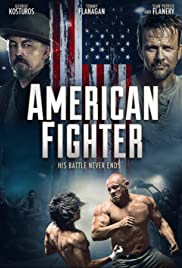 Ali Jahani (George Kosturos), a college wrestler from Iran, lives in America while his sick mother (Salome Azizi) remains in Iran. His father was murdered at the airport in Iran before he could board the plane to America. To raise the $30,000 that he needs to fly his mother to America for proper medical treatment, Ali becomes an underground fighter just like his friend, Ryan (Bryan Craig). Tommy Flanagan plays McClellen, the fight promoter who hires Ali, and Sean Patrick Flannery plays Ali's trainer, Duke. A truly great sports drama like Rocky, Raging Bull, and The Fighter isn't really about the sport, but about human beings and the struggles that they go through. What happens outside of the ring holds more weight than what happens inside of it. American Fighter has great fight scenes, but when it comes to the drama beyond it, that's where it falls flat. The screenplay by writer/director Shaun Paul Piccinino and co-writer Carl Morris doesn't develop the relationships between Ali and his mother enough nor between Ali and his friend or Ali and his trainer or promoter. American Fighter is more concerned about getting to the next fight scene than about showing or delving into Ali's internal struggles as a human being. That might entertain audiences who aren't looking for more than just a well-choreographed action film, but anyone who wants a compelling sports drama will be disappointed. There's also a distracting subplot involving Ali's love interest, Heidi (Allison Paige), that just seems like it's included because it has to be. This is the kind of B-movie where you can feel the wheels of the screenplay turning every step of the way. With a leaner, tighter screenplay, perhaps it could've been entertaining on a visceral level and just become a rousing action-packed popcorn movie. Instead, the plot tries to be too many things all at once---a drama, action movie and romance--while just going through the motions and not breathing life into any of the scenes don't involve fighting. The performance by George Kosturos is decent, but he doesn't rise above the mediocre, on-the-nose dialogue. Sans an engaging story and well-written characters, the conventional third act doesn't earn its uplift. American Fighter at a running time of 1 hour and 38 minutes, has exhilarating fight scenes, but a shallow, unfocused story that fails to pack an emotional punch. 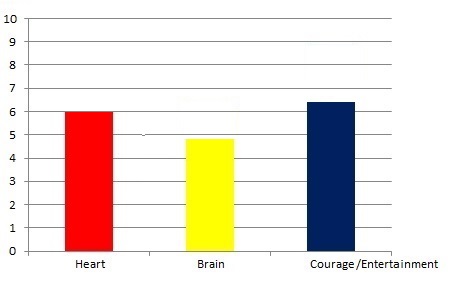 Dream Horse 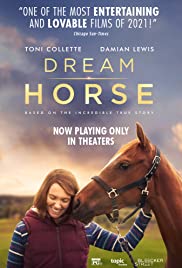 Jan Vokes (Toni Collette) juggles two jobs as a supermarket clerk and a bartender while taking care of her disabled husband, Brian (Owen Teale), in a small Welsh town. One night at the bar, she meets Howard (Damian Lewis) who gives her the idea to breed a race horse. She enters the horse, named Dream Alliance, and enters him in a horse race. Dream Horse has all the ingredients on the surface that could turn it into a rousing crowd-pleaser like Seabiscuit, but the it's let down by the pedestrian screenplay by Neil McKay. This is the kind of movie where you can hear the keys of the keyboard typing during every line of dialogue. You can leave to go to the bathroom at any point and easily guess what you missed during those few minutes. Not that there's anything wrong with conventional underdog stories, but if they're written without much depth and nuance, they don't quite hit the emotional beats that they aim for. There aren't enough scenes with Jan and her horse which show them bonding with each other. The screenplay also lacks wit and comic relief which makes it all feel somewhat dry, but at the same time, it also doesn't explore its darker themes more profoundly---as though it had to stay "family friendly". When the film does attempt to move you to tears or to lift your spirits, it feels contrived and sacchrine, and tries too hard to tell you how to feel. Why not trust the audience's emotions more? That said, the horce racing scenes are exciting to watch and provide the film with much-needed suspense. Dream Horse is very fortunate to have Toni Collette as the lead because she's such a naturally talented actress that she elevates the film ever so slightly above its dull screenplay. The emotional depth comes from her performance which keeps you moderately engaged thanks to her unbridled warmth and charisma as well. Everyone else gives decent performances, but not enough to stand out. There's one amusing, charming scene at the end when everyone, including some of the real life people which this film is based on, gathers to sing Tom Jones' "Delilah." That scene alone feels more captivating and engrossing than the rest of the film. At a running time of 1 hour and 53 minutes, Dream Horse is an often contrived and dull underdog tale that's neither moving nor engaging enough to rise above mediocrity. At least Toni Collette's performance comes to the rescue by saving it from being a snooze-fest. 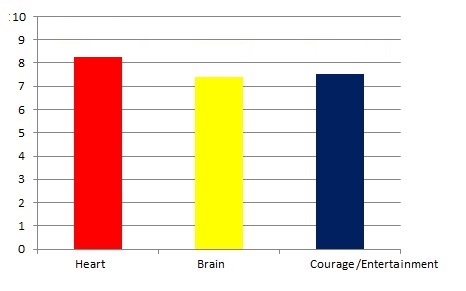 Drunk Bus 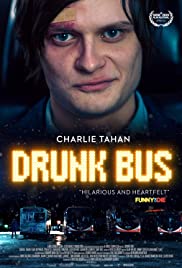 Michael (Charlie Tahan) works as a night bus driver for the college he recently graduated from in the small town of Kent, Ohio. He lives with a roommate (Zach Cherry), still has feelings for his ex-girlfriend, Amy (Sarah Mezzanotte), and has to deal with drunk and disorderly bus passengers. Pineapple (Pineapple Tangaroa), a security guard, gets assigned to protect Michael after one of the passengers beats him up. He gradually befriends Pineapple along with Kat (Kara Hayward) and her friend, Justin (Tonatiuh). Drunk Bus is The screenplay by Chris Molinaro does have some low brow humor that veers toward Judd Apatow and Farrelly Brothers territory, but, for the most part, it has witty dialogue that's quite funny and perceptive, especially when it comes to Pinneaple's quips. Even though the plot can be easily predicted once Michael meets Pinneaple, so what? There's nothing inherently wrong with predictability. A film's plot, after all, isn't as important as how it actually goes about its plot which, in this case, remains one that's grounded in realism. Most of the characters feel real because the filmmakers treat them like living, breathing human beings. Michael feels stuck in a mundane job and lacks direction and self confidence. Essentially, he's a prisoner trapped in a prison without bars. How Pineapple helps to free him from that prison is part of what makes Drunk Bus surprisingly touching and inspirational. Molinaro avoids cloying or preachy moments and also doesn't use voice-over narration as a means of getting inside the head of its protagonist. With a less sensitive screenplay, Pinneaple could've been written as a cliched, one-note character, but instead he's a human being with issues of his own that he's struggling with given his backstory. The fact that Molinaro doesn't include flashbacks or subplots involving Pineapple's wife and kid shows that he has a grasp on how to provide the audience with just enough exposition in just the right way. Pineapple Tangaroa gives a warm, charismatic performance and has great chemistry with Charlie Tahan. Their rapport along with the journey of their friendship provides plenty of depth and poignancy to the film. Some of the side characters are also interesting because of how eccentric they are, i.e. FU. Bob (Martin Pfefferkorn), a man on a wheelchair who has more to him than meets the eye which won't be spoiled here. The same can be said for a goth girl (Sydney Farley), whom Michael sleeps with.
Ultimately, Drunk Bus is kindred spirits with Terry Zwigoff's Ghost World more than with any of Apatow or the Farrelly brothers' movies. Both Drunk Bus and Ghost World use a bus as a metaphor while leaving the meaning of that metaphor open to interpretation. Even FU Bob's wheelchair can be seen as a metaphor. Enid and Michael are loners who desperately yearn to escape their boring, vapid, alienating life and to discover their true selves. They both meet someone older who awaken their innate feelings which sets them on an emotional journey and opens the door for some ephiphanies as well as emotional maturity. At a running time of 101 minutes, Drunk Bus is an equally funny, perceptive and heartfelt coming-of-age story about friendship and self discovery. Please be sure to stay through the end credits for a stinger. 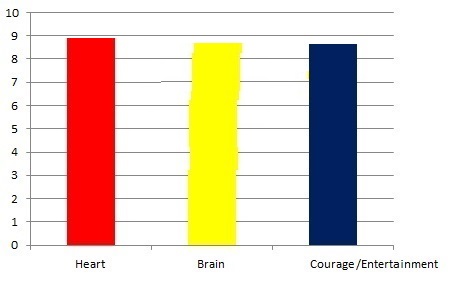 Seance 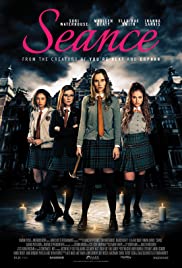 Camille Meadows (Suki Waterhouse) arrives at Edelvine Academy for Girls as a new student after the mysterious suicide of an Edelvine student, Kerrie (Megan Best). She had jumped out of a window when Alice (Inanna Sarkis) and her friends, Yvonne (Stephanie Sy), Lenora (Jade Michael), Bethany (Madisen Beaty), and Rosalind (Djouliet Amara), performed a seance to conjure the ghost of another student who also committed suicide. A fight with Alice leads to both Camille and Alice getting into trouble with the headmistress, Mrs. Landry (Marina Stephenson) and getting assigned detention. They perform seances together as their friends die one by one. Part ghost story, part slasher/murder mystery, Seance neither has enough scares to be an effective horror film nor the suspense needed to make an an effective thriller. The screenplay by writer/director Simon Barrett has a solid first act before taking a nosedive during the uneven second act that becomes increasingly tedious. Is the culprit behind the deaths on-screen human or supernatural? What might be their motive? Does it have anything to do with the seances? The answers to those questions become increasingly easy to predict as the film progresses, but the lazy screenplay doesn't really help you to care about what the answers are.
To be fair, Seance is as not lethargic as the Suspiria remake from a few years ago, but it comes close. It lacks the stylish cinematography which Suspiria had to engage audiences on a palpable level. Both films save their blood-and-guts scene until the end, although there's not much here that pushes the envelope or disgusts the audience like in Suspiria. The characters, which there are too many of, come across more as caricatures than as human beings which means that it's hard to be emotionally invested in their relationships or to even care about who will die next. Mrs. Landry has a son, Trevor (Seamus Patterson), but he too remains forgettable as a character. There's no psychological horror to be found here which would be fine if there was something else to hold one's interest, i.e. campiness or dark comedy like in You're Next written by Simon Barrett. Seance takes itself too seriously even during its over-the-top, twisted third act that would've been surprising if it made any sense in hindsight or if you cared about any of the characters to begin with. On a positive note, Seance's running time is about 90 minutes, so it's torture to sit through it. 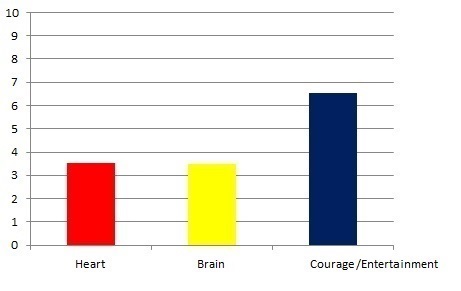 When Hitler Stole Pink Rabbit 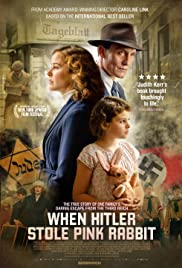
Nine-year-old Anna Kemper (Riva Krymalowski) lives in Berlin with her mother, Dorothea (Carla Juri), father, Arthur (Oliver Masucci), and older brother, Max (Marinus Hohmanm). When Adolph Hitler becomes chancellor of Germany in 1933, Arthur, a theater critic who bravely criticizes Hitler in his writings, flees to Prague before meeting Anna, Max and Dorothea in Zurich to start a new life there and protect his family from the Nazis. Anna can only bring one of her stuffed animals with her, so she leaves behind her beloved pink rabbit which the family's housekeeper, Heimpi (Ursula Werner), promises to return to her in the future. Anna's uncle, Julius (Justus von Dohnányi), a zookeeper, stays in Berlin and keeps in touch with Anna through postcards even when she and her family move from Zurich to Paris.
Based on the memoir by Judith Kerr, the screenplay by writer/director Caroline Link and co-writer Anna Brüggemann tells the WWII story through the perspective of Anna. To be fair, the task to condense a novel to 2 hour movie and to make it cinematic is no easy task. The same can be said about the challenge of getting inside a character's head because, with a book, it's easier to achieve that feat. When Hitler Stole Pink Rabbit does a decent job of getting inside Anna's head, but it's hard to be fully absorbed by the story because not enough time is spent focusing on her life in Berlin, Zurich and Paris. The film seems at times like it's in a hurry to move the plot forward rather than to take its time to allow the audience to get to know the characters. You don't get to see how Anna's uncle, Julius, suffers in Berlin, although you briefly hear about some of his struggles later on. The filmmakers could have easily escalated the dramatic tension because the Kemper family's life always remains in danger as they flee the Nazis, but instead of turning the film into an edge-of-year-seat thriller, it's more of a drama with a few intense moments. Despite his presence in the title, Hitler isn't even shown on-screen. By keeping the horrors of the Holocaust off-screen, Link and Brüggemann leave it to the audience's imagination which makes as horrifying for those who already know about the Holocaust. For children, though, nothing like the brutal and harrowing The Boy in the Stripped Pajamas; it's more along the lines of A Bag of Marbles which is also a family-friendly depiction of events that took place during the Holocaust. In terms of production values, the set and costume designs look authentic to the time period which adds to the film's authenticity. There's also some breathtaking, bright and colorful scenery that serves as a contrast to the tragedy of the Holocaust. Anna's stuffed pink rabbit that she leaves behind can be seen as a metaphor for the loss of her childhood innocence or her longing for childhood innocence. Fortunately, the film doesn't go too heavihanded with that metaphor while trusting the audience's intelligence to decide for themselves what the stuffed animal means beneath the surface. Riva Krymalowski is very well cast as Anna and gives a heartfelt performance that brings plenty of depth to the role. The depth of emotion in this film comes, ultimately, from the performances more than the screenplay. At a running time of just under 2 hours, When Hitler Stole Pink Rabbit, is a tender, gentle and often engrossing story that leaves the true horrors of the Holocaust to the imagination of the audience. 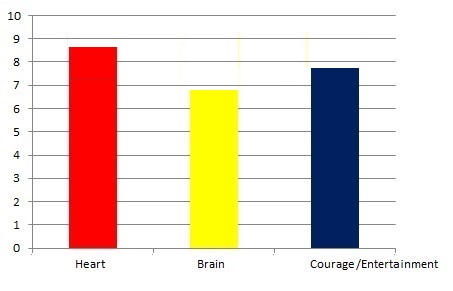 |